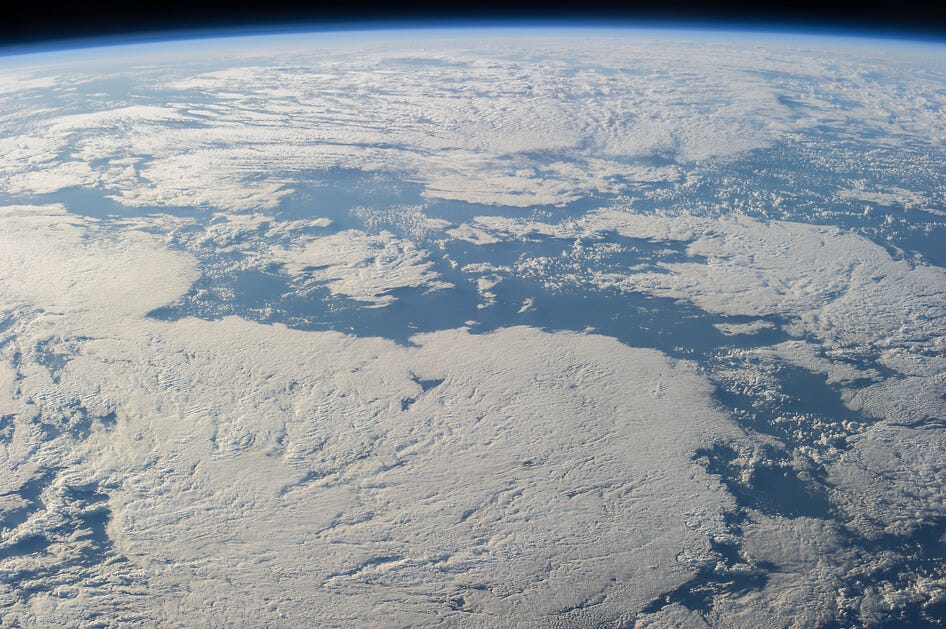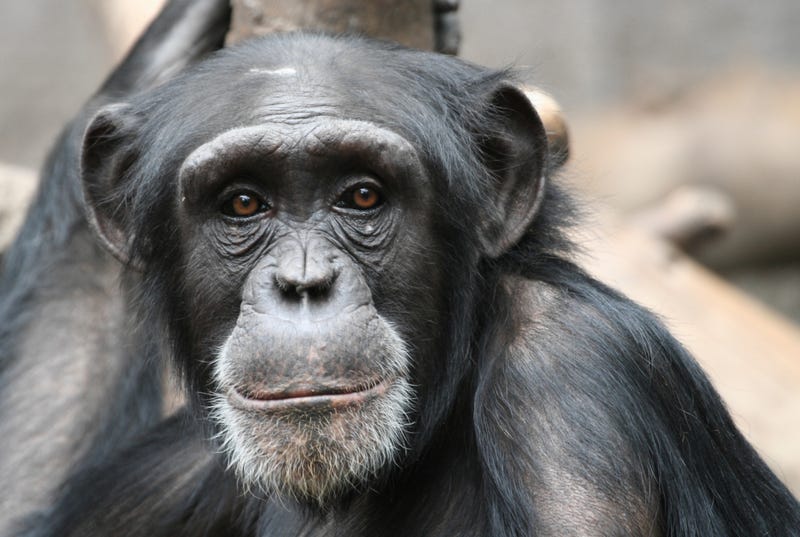The Burden of Being Alive in the Anthropocene
The case for Marine Cloud Brightening to avoid deadly heatwaves and save ecosystems
Exactly how we evolved from an microbe into a primate remains a bit of a mystery to me. But here we are. An abundant, almost hairless, primate with an oversized brain. Apparently, thinking gave us the edge in evolution.
Having a mind is both a burden and an asset. Truth be said, sometimes we enjoy some useful and inspirational brainwaves. And sometimes we make some amazing discoveries. Such as petroleum.
Petroleum is at the basis of pretty much everything we have done over the past 150 years. Memorable achievements are directly linked to this amazing fuel, such as cars, airplanes, a plastic island the size of France, a human population explosion and the near complete extinction of all other species. Without a doubt, petroleum launched us into the Anthropocene, the era where the geology and climate of planet Earth are shaped by man.
Obviously, the cliche applies: with great power comes great responsibility. And this is more than an inconvenient truth. It’s a nightmare so dark half the world population is in denial and the other half in shock. What the hell, did you say we are responsible? No way!
Sarcastically, some people say the good news is the Earth does not “need” us, in case we were to wipe out all complex life nature will recover given enough time. Very comforting, isn’t it? The bad news, without a doubt, is that, yes, it’s true we actually created the Anthropcene and are living it now. Whatever we do choose to do, choose not to do, or fail to do will affect the livability of planet Earth, for us and all other life.
In case you think you are not part of the problem, think again. How many days, weeks or months would you survive without eating any food that needed a fossil fuel input at some point? You may be working the land by hand without chemical inputs, not use any transportation etcetera, but even just reading this means you are part of the problem since Substack, the internet and all devices connected to the internet are part of the problem.
There is almost nowhere to hide, and even in such an extremely rare and remote hideout you would have to deal with the consequences of human choices made elsewhere. It’s what eloquent people like to call the human predicament, which is just a nice way of say we’re in serious trouble of our own making.
If you’ve read my past posts you might know I speak about a policy proposal aimed at achieving (geological) netzero. That’s a good idea, I believe, but it is not going to cut it unfortunately. We have reached the point where nothing we do or don’t do can avert dangerous global warming. Obviously, every greenhouse molecule we add to the atmosphere aggravates the problem, but as it is, the problem we have created is already deadly.
Pollution and global warming are killing people and other species at an accelerating rate. We are witnessing a human-made mass extinction event. The question is, are we going to continue living the Anthopocene unconsciously, using our super powers with reptilian wisdom, fulfilling short-term desires, or are we going to live up to our species name, homo sapiens, and become wise stewards of the planet we inhabit and are reshaping.
Saying that we are not wise enough to assume responsibility for all life on Earth might be true, but won’t stop the mass extinction. Saying we must just stop oil and other polluting activities is something I subscribe to, indeed, we must stop pollution, including CO2 asap, but unfortunately even the most optimistic scenario is not fast enough. I believe it is time to ask the question what we can do in terms of damage control.
What can we do to avert climate tipping points? What can we do to avoid deadly heatwaves? What can we do to save ecosystems?
Since our actions have inadvertently changed the radiative balance of the planet we can think of actions that may restore the balance, with the goal to return, as soon as possible, to a global biophysical system that supports life without continuous human directed effort.

Although our planet is mostly covered by water it’s more white than blue, due to cloud cover and snow at the poles. As we know, also from experience, white surfaces are cooler than dark surfaces, and thus more white clouds, in particular low-hanging white clouds may help to keep the planet cool, or at least not dangerously overheated.
Most people know clouds are just water vapor, that is tiny water droplets. Not everyone knows small particles are needed to act as condensation nuclei to facilitate the formation of cloud droplets. Tiny particles, suspended in air are called aerosols. They can be of natural origin, such as dust, or plant pollen, or salt crystals from sea spray, or from industrial origin, such as sulfur in fossil fuel emissions.
Inadvertently, new shipping fuel regulations from the International Maritime Organization, aimed at cutting harmful sulfur dioxide emissions, have shown that anthropogenic sulfur aerosols have contributed to cloud formation at sea. In this case, the removal of these aerosols in 2020 appreciably decreased maritime cloud cover, in particular in the northern Atlantic, which has been linked to accelerated ocean warming over de past years.
This unintentional reverse Marine Cloud Brightening (MCB) experiment demonstrates the potential of MCB for active cooling. Personally, I believe MCB should be researched, as it may be feasible to create more protective cloud cover simply by vaporizing seawater. Small seawater droplets evaporate rapidly, leaving the salt behind as an aerosol. Subsequently, the salt aerosol can act as a condensation nuclei for the formation of marine clouds capable of reflecting sunlight back into space, and thus reducing the heating.
Using seawater for MCB mimics an important natural pathway for cloud formation. Salt is one of the most abundant aerosols on Earth as it occurs naturally in the ocean. Personally I see potential to deploy MCB using renewable energy and achieve sufficient scale to, at least partially, counteract anthropogenic global warming, until we have brought down greenhouse gas concentrations in the atmosphere.
Don’t get me wrong, I am not happy that we have reached this point. It would have been much better if we had phased-out emissions decades ago. But the reality is we haven’t. Instead we are emitting more CO2 into the atmosphere than ever and we are not on track to meet the emission reduction targets set at the 2015 Paris COP. Given this reality, and the accelerated warming we are observing, I can no longer justify not investigating active cooling options. In particular methods such as MCB, that are more controlled and localized, compared to for example stratospheric aerosol injection.
To avoid deadly heatwaves, lost crops, destruction of ecosystems and climate tipping points, I believe we urgently need to assess the effectiveness of MCB, its environmental impacts and its climate risks. The simple argument being, that those risks may be lower than the risk of inaction. This is what I mean with the “burden of being alive in the Anthropocene”. Being alive in the Anthropocene comes with great responsibility, whether we like it or not.
Since our actions and inactions have such a profound impact on the livability of the planet we need to become much more self-conscious, and somehow make decisions on how we choose to move forward. The responsibility that comes with the Anthropocene is a huge challenge and I hope we choose to be wise stewards of the planet, on behalf of our own species, and our offspring, and also on behalf of all the other species that are at our mercy.
Additional reference:
Read my previous post:
Brainy primates on the barbecue along with everyone else
Although we’re all brainy primates, inhabiting the same spherical rock circling the a single star in the universe; although we share the same atmosphere and swim in the same world ocean, it is very unlikely we will agree on how to navigate the polycrisis together.





The main message about the urgent need for responsible action in the Anthropocene is sometimes overshadowed by lengthy explanations. Condense the historical context of petroleum and focus more on the current crisis and solutions. The tone shifts between informative and sarcastic. Maintaining a consistent tone will help your message come across more clearly.
Marine Cloud Brightening has the drawback of not having a place in the marketplace. Who could possibly make money by pumping aerosols into the atmosphere? If the answer is "no one", then it's unlikely to happen. Time and again it has been shown that the prospect of lower losses for everyone in the future cannot compete with more profit for me today.
And if humans were capable of managing earth systems well enough to mitigate the damage of the Anthropocene, wouldn't they be capable of the much easier job of preventing the damage in the first place? It would have been so much easier to keep CO2 out of the atmosphere than deal with the consequences after it's already there.
So, if the sudden vanishing of human impact from civilizational collapse (our best near-term prospect) is not enough to cause an eventual return to something like the Holocene, then it's too late after all. Keeping civilization going just to manage its damage to the environment is a losing bet, throwing what's still good in the environment after bad.